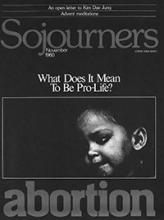Kim Dae Jung, the leader of opposition to two south Korean dictators--first Park Chung Hee and now Chun Doo Hwan--has been sentenced to death by hanging. In a month-long general court-martial concluded September 17 in Seoul, he was convicted on five counts ranging from "sedition" to "conspiracy to overthrow the government."
The military court convicted 23 others on related charges, sentencing them to prison for up to 20 years. Among the 23 was Rev. Moon Ik Hwan, a leading theologian and translator of the Korean New Testament.
Kim, 54, was interviewed in the October, 1979, Sojourners. In that interview, as throughout his political career, he insisted on a peaceful transition to a democratic government that respects human rights.
Last May, after several months of outspoken criticism of military rule, Kim was imprisoned. A massive insurrection, initially nonviolent, erupted in the city of Kwangju. Hundreds were killed in the week-long siege before troops subdued tens of thousands of protestors.
Kim was charged with instigating those riots, even though it was more directly his arrest that triggered the rebellion.
"I have made every effort to achieve democracy," Kim told the court, "but I never tried to seize power by an insurrection."
We hope that Sojourners readers will join us in a letter-writing campaign. Kim's death sentence is now under review. Letters of protest to the Korean government, and to the U.S. government which backs the Korean regime, are needed.
Read the Full Article

